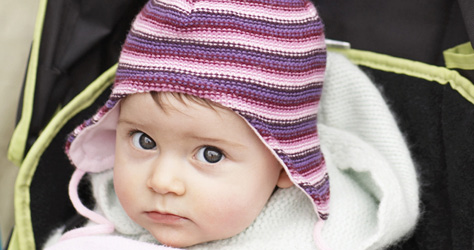Move baby, move
Some babies may be walking confidently now, but plenty more aren’t: the average age for their first steps is around 13 months. And if your baby is a ‘bottom shuffler’ or a really fast crawler, they may be less interested in walking than a baby who never really liked crawling. Help their cruising by putting a toy on the sofa a few steps away from where they’re standing and encourage them to try to reach it.
At a glance
- Most babies will have grown by about 25 cm since birth and their weight will have doubled or tripled
- About now your baby will love ‘helping’ you tidy toys away or sort the washing. Turn it into a game as much as possible
- It’s a great time to model good manners – say ‘thank you’ when your baby hands you something and ‘please’ when you are asking them for something

Look how I’ve grown
Most babies will have grown by about 25 cm since birth and their weight will have doubled or tripled. It’s not an exact science, though: if your baby is moving a lot they’re burning a lot of calories and their weight gain might slow down, or if they’ve recently been ill with a tummy bug they may have temporarily lost weight (they’ll catch up soon). As long as your baby is roughly around the same ‘centile’ of the growth charts in their Red Book, there’s no cause for concern. Their brain has grown a lot too: it has now reached 60 per cent of its adult size and doubled in volume since birth.
Mini me
About now your baby will love ‘helping’ you tidy toys away or sort the washing. Turn it into a game as much as possible (finding matching socks etc) and give loads of praise and encouragement. Some babies develop a bizarre obsession with wiping and dusting – enjoy it while it lasts.
Ps and Qs
It’s a great time to model good manners – say ‘thank you’ when your baby hands you something and ‘please’ when you are asking them for something. It’s too early to insist on them using the words – but it’s good practice to be hearing them regularly.
Your baby will probably begin to respond to simple questions and instructions, such as ‘please give the cup to mummy’. They may hand you the cup or even shake their head: at last – the true beginnings of conversation.
How you can help
- Play tunnels and tents are great fun – or make your own with cardboard boxes taped together
- Your baby may have enough hand-eye co-ordination and grip to be able to hold a chunky crayon now (a thick piece of chalk is a good alternative for outside in the summer)
- Pretend to be different animals together, which will develop creativity and imagination
- Encourage moving with a push-along toy, like a traditional wooden truck with bricks inside or a push-along baby walker
- Keep chatting to them (‘let’s count the stairs, 1,2...’) and asking questions (‘can you find the toy rabbit?’) to promote their language development
Game of the month
Their own cupboard: They’ll love taking things in and out of cupboards and drawers now. If you’ve got the space, it’s fun to ‘give’ them one of the cupboards in the kitchen or sitting room, filling it with plastic cups, plates, wooden spoons, plastic cookie cutters etc.
They're all different
A small note on developmental milestones: it’s really true – all babies are different and although we can encourage them, they will do things at their own pace and in their own time. Read more about baby development anxiety here and our at-a-glance milestones guide here.